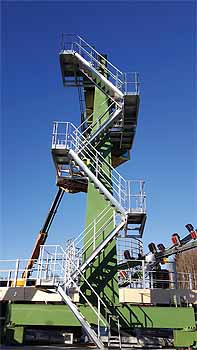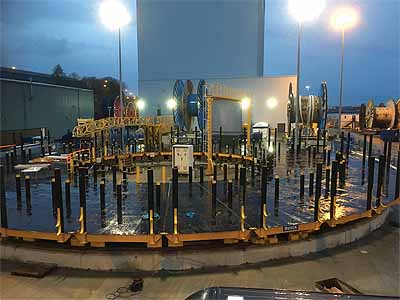Munck Cranes AS
Weighing up opportunities
By focusing on customer satisfaction, enhancing quality and the continuous development of its products, Munck Cranes AS has become a leading manufacturer of cranes in Norway, the Nordic countries and Northern Europe
Founded on 25th October 1924 by Mr Sverre Munck, an educated electrician engineer from the University of Trondheim, Munck AS initially began as a trading company with products ranging from fuses and lightbulbs to escalators, elevators and electric wire rope hoists.
With the first manufacturing plant completed in 1946, the number of employers significantly increased from 30 to 300 people, which was mainly due to the result of a major contract to make 18  units of trolley buses for Bergen Sporveier, the local bus company. It was during this milestone in the company’s short history that the Munck electric wire rope hoist was designed and full production commenced, which involved hoists, industrial cranes for all types of industry onshore as well as onboard vessels.
units of trolley buses for Bergen Sporveier, the local bus company. It was during this milestone in the company’s short history that the Munck electric wire rope hoist was designed and full production commenced, which involved hoists, industrial cranes for all types of industry onshore as well as onboard vessels.
A pioneer within the Norwegian export industry, the company exported its first hoist to Sweden in 1948, which was shortly followed by another two to England; since then, export to overseas became a rapidly growing market for Munck. In response to this, subsidiary firms were set up in locations such as the US, Canada, the UK, Sweden and Belgium and a network of agents were established in other strategic areas across the globe.
Taken over by the family company Furnes Founded on 25th October 1924 by Mr Sverre Munck, an educated electrician engineer from the University of Trondheim, Munck AS initially began as a trading company with products ranging from fuses and lightbulbs to escalators, elevators and electric wire rope hoists.
With the first manufacturing plant completed in 1946, the number of employers significantly increased from 30 to 300 people, which was mainly due to the result of a major contract to make 18 units of trolley buses for Bergen Sporveier, the local bus company. It was during this milestone in the company’s short history that the Munck electric wire rope hoist was designed and full production commenced, which involved hoists, industrial cranes for all types of industry onshore as well as onboard vessels.
A pioneer within the Norwegian export industry, the company exported its first hoist to Sweden in 1948, which was shortly followed by another two to England; since then, export to overseas became a rapidly growing market for Munck. In response to this, subsidiary firms were set up in locations such as the US, Canada, the UK, Sweden and Belgium and a network of agents were established in other strategic areas across the globe.
Taken over by the family company Furnes ASRune Vabø, Managing Director at Munck Cranes AS: “Our main product can be divided into four segments: service and maintenance, standard cranes, automatic crane systems for offshore installations and offshore special equipment. Within the latter division we are strongly involved in supplying winding turntables, in fact, we are currently producing two large turntables with a load capacity of 16,000 tonnes.”
This current contract follows the company’s recent involvement in a number of notable projects, including the delivery of three Munck semi gantry cranes with an operator cabin mounted to a centre fixed column as well as a six tonne column crane with arm length of seven metres and a column height of 11 metres. This cable handling system was mounted to a turntable used for storing umbilicals in Norway five months ago. Although Munck Cranes has seen steady growth in demand for its winding turntables, the company’s main products are overhead travelling cranes and hoists. “These products continue to be our bread and butter; we have our own range of hoists that we use for a range of things, these have a capacity from under one tonne to 100 tonne. We also have these heavy duty cranes that we can’t use as a standard hoist; the biggest one in production at the moment is 220 tonnes.”
Also known as automatic cranes, overhead travelling cranes offer customers in the process industry advantages including increased security and lower operating and maintenance costs.
Plants handling hazardous waste also use automatic cranes instead of fork lift trucks and conveyers to ensure all crew work in the safe zones of the facility. Because these cranes are part of a Lomancomputer system that operates throughout the facility, these automated cranes offer notable advantages. For example, the waste in an incinerator plant can be reduced significantly as a result of the main computer being provided with the exact information on the volume of garbage, which is then fed into the incinerators. Suitable for locations such as glass processing plants, composting plants, galvanization plants, zinc production factories and incinerator plants, Munck Cranes’ automatic cranes would be a beneficial addition to any company’s facility.
Meanwhile, Munck Cranes offers a variety of hoists that are suitable for all kinds of lifting, with wire electric hoists frequently used for heavy loads between 630 kg to 108,000 kilos, while its chain hoists can be manually driven or electric; these are mainly used in lifting of a load between 40 to 20,000 kilograms. Within the electric wire hoist range is the electric wire hoist 31-series, which are specifically designed to meet the challenges of precision lifting material. Following rigorous tests, this new range has met Munck Cranes’ high standards for quality and boasts a robust design and limited need for service – integral factors that lead to low maintenance costs. Although the Munck standard hoist range covers 630 kg to 108,000 kilos, Munck Cranes is also able to create solutions that offer lifting capacities of up to 500,000 kilos; these units are built from superior quality components and offer the same economical advantages as the standard programme. As expected, all components comply with international standard such as EN-NS, FEM, ISO, CMAA and HMI.
Renowned for its commitment to quality, the company has recently been involved in a number of notable projects and even beat competitors to become crane supplier to the 20 million Norwegian Kroner (NOK) Follo Line Project in Oslo, Norway. As the largest infrastructure project in Norway, it involves adding four tracks into the capital of Oslo, which will offer more trains as well as faster trains on schedule. The project will also include a 20 km long tunnel that will become Norway’s first long twin tube rail tunnel.
Although its wide range of high quality products have cemented Munck Crane’s reputation in the market, Rune says it is the people behind the cranes that make the company special: “We have the knowledge, focus on quality and commitment to customer service to ensure problems are solved or new options are provided to clients. Our key customers are the moment are in the energy, oil and gas and aluminium sectors; for these customers we want to become stronger in all four segments of the business, to enhance our service and standard equipment and also our special handling equipment for the offshore sector.
“There is a great deal of potential in the energy sectors, not only in Europe but also the wind industry across the globe; we have also seen an increase in demand for our automatic cranes in waste industries. Despite problems due to oil prices and exchange rates we have come out of these challenges strong; it is our goal to continue getting stronger,” he concludes.
Munck Cranes AS
Products: Cranes and lifting systems
